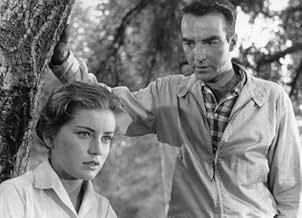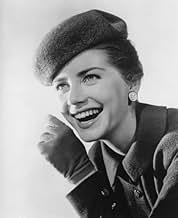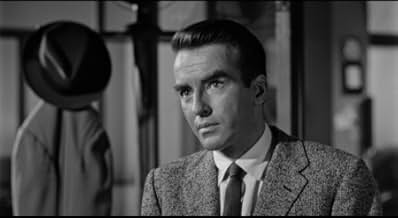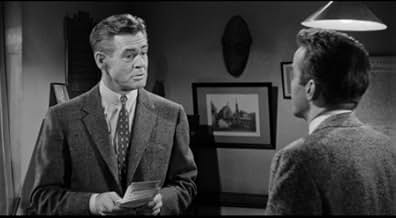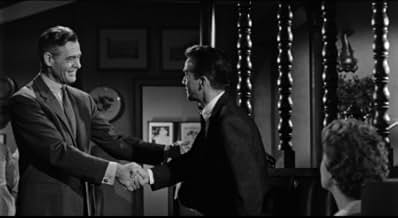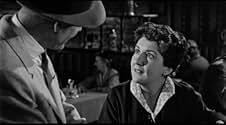VALUTAZIONE IMDb
6,6/10
1616
LA TUA VALUTAZIONE
Aggiungi una trama nella tua linguaEager for a job, journalist Adam White accepts the lowly position of columnist for the advice-giving section of the Chronicle but he often clashes with his cynical editor, Shrike.Eager for a job, journalist Adam White accepts the lowly position of columnist for the advice-giving section of the Chronicle but he often clashes with his cynical editor, Shrike.Eager for a job, journalist Adam White accepts the lowly position of columnist for the advice-giving section of the Chronicle but he often clashes with his cynical editor, Shrike.
- Regia
- Sceneggiatura
- Star
- Candidato a 1 Oscar
- 2 candidature totali
Johnny Washbrook
- Johnny Sargeant
- (as John Washbrook)
Recensioni in evidenza
Montgomery Clift is a writer hired to be "Miss Lonelyhearts" for a newspaper in "Lonelyhearts," a 1958 film also starring Robert Ryan, Myrna Loy, Delores Hart, and Maureen Stapleton in her film debut.
About 30 years ago - yes, 30 - I saw the play "Miss Lonelyhearts" with none other than Kelsey Grammar, who had not yet gone to Hollywood. The play, as well as the book, are quite different from what ended up on the screen. In the film, the ending was changed to a more upbeat one.
This is a great film if you're contemplating suicide because this will take you right over the edge. It is relentlessly depressing with some pathetic characters and some unlikeable ones. Adam (Clift)is a man with a hidden past that he keeps even from his girlfriend (Delores Hart). All the viewer really knows at first is that he was raised in an orphanage and has a father in prison. The paper on which Adam works is owned by William Shrike, an abusive, cynical man (Ryan) who is horrible not only to his employees but to his wife (Myrna Loy) because of her infidelity 10 years before. This is a man who carries a grudge. When he meets Adam, he thinks his sincerity is fake and becomes determined to wear him down. His first step is to hire him as Miss Lonelyhearts. Adam becomes very bothered by the problems his readers send to him, especially because he can't help anyone. When Shrike dares him to meet one of the letter-writers, he does so. It's Maureen Stapleton, a needy woman with a crippled husband who can't make love to her.
The performances in this film are very good, but the film isn't. Clift apparently was very disappointed in it because it lacked none of the bite of the novel and none of the symbolism of Adam as a Christlike figure bearing the sins of others. Robert Ryan is very convincing as the hateful Shrike, and Myrna Loy is beautiful and sad as his wife. Stapleton received an Oscar nomination for her effective performance. An accomplished stage actress, Stapleton evokes the desperation of this lonely woman.
Montgomery Clift by this time was almost at a point where he was dependent upon the kindness of strangers. He was too much of a risk for Hollywood to be interested. Like so many people who are victims of horrible accidents, he had become addicted to painkillers and alcohol. If not for Elizabeth Taylor making a case for him, he would not have been cast in "Suddenly, Last Summer." As it was, Mankiewicz almost stopped shooting on the film. He is fragile and glassy-eyed here, in obvious pain, and his voice slurs. The fragility works well in this role as does the sensitivity he brings to the part. He still had a beautiful smile, which unfortunately he doesn't get to use much here.
It's always wonderful to see Montgomery Clift perform, even toward the end of his career. That interesting voice of his, the intelligence and sensitivity of his work, and the tenderness with which he approached a love scene were unmatched. His film career was relatively short, but he left a powerful legacy. "Lonelyhearts" is not a great film, but it stars Montgomery Clift, so it's worth seeing.
About 30 years ago - yes, 30 - I saw the play "Miss Lonelyhearts" with none other than Kelsey Grammar, who had not yet gone to Hollywood. The play, as well as the book, are quite different from what ended up on the screen. In the film, the ending was changed to a more upbeat one.
This is a great film if you're contemplating suicide because this will take you right over the edge. It is relentlessly depressing with some pathetic characters and some unlikeable ones. Adam (Clift)is a man with a hidden past that he keeps even from his girlfriend (Delores Hart). All the viewer really knows at first is that he was raised in an orphanage and has a father in prison. The paper on which Adam works is owned by William Shrike, an abusive, cynical man (Ryan) who is horrible not only to his employees but to his wife (Myrna Loy) because of her infidelity 10 years before. This is a man who carries a grudge. When he meets Adam, he thinks his sincerity is fake and becomes determined to wear him down. His first step is to hire him as Miss Lonelyhearts. Adam becomes very bothered by the problems his readers send to him, especially because he can't help anyone. When Shrike dares him to meet one of the letter-writers, he does so. It's Maureen Stapleton, a needy woman with a crippled husband who can't make love to her.
The performances in this film are very good, but the film isn't. Clift apparently was very disappointed in it because it lacked none of the bite of the novel and none of the symbolism of Adam as a Christlike figure bearing the sins of others. Robert Ryan is very convincing as the hateful Shrike, and Myrna Loy is beautiful and sad as his wife. Stapleton received an Oscar nomination for her effective performance. An accomplished stage actress, Stapleton evokes the desperation of this lonely woman.
Montgomery Clift by this time was almost at a point where he was dependent upon the kindness of strangers. He was too much of a risk for Hollywood to be interested. Like so many people who are victims of horrible accidents, he had become addicted to painkillers and alcohol. If not for Elizabeth Taylor making a case for him, he would not have been cast in "Suddenly, Last Summer." As it was, Mankiewicz almost stopped shooting on the film. He is fragile and glassy-eyed here, in obvious pain, and his voice slurs. The fragility works well in this role as does the sensitivity he brings to the part. He still had a beautiful smile, which unfortunately he doesn't get to use much here.
It's always wonderful to see Montgomery Clift perform, even toward the end of his career. That interesting voice of his, the intelligence and sensitivity of his work, and the tenderness with which he approached a love scene were unmatched. His film career was relatively short, but he left a powerful legacy. "Lonelyhearts" is not a great film, but it stars Montgomery Clift, so it's worth seeing.
Nathaniel West's "Lonelyhearts" is a haunting novella about how an idealistic young man is affected by his job as an advice-giving columnist for his town's newspaper. It was intelligently adapted for the stage in the mid-50's, and the film version plainly uses that adaptation as a reference point as much as the novel itself. In ways, the film expands on the play's success, opening it up to reveal an idealized 50's picture-postcard town on the surface before centering on the insensitivity lying just underneath. Writer/Producer Schary and Director Donohue are to be commended for the atmosphere they have successfully created. It is unfortunate that they did not have enough faith in the material to resist the temptation to give it a happy ending, an ending which really is not in keeping with the events which precede it.
It must have seemed like a great idea to cast Montgomery Clift in the lead role of Adam, and a few years earlier it would have been, but this compelling actor's personal demons had so impacted upon him by this time that it is impossible not to be distracted by his unhealthy state of being. His slurred speech, unsteady gait and jerky mannerisms are entirely at odds with this character, who is said to have never had a stronger drink than a coca-cola. He is too good of an actor not to have effective moments - he works beautifully with Onslow Stevens, who plays his father - but this is a performance that holds our attention largely for unintentional reasons. Maureen Stapleton is sensational in her film debut as a writer to the column who manipulates Adam, and her performance would be right at home in a more faithful and successful version of this novel. Otherwise, this is a well-intended film which fails both to adequately reflect the novel on which it is based and to succeed on it's own terms.
It must have seemed like a great idea to cast Montgomery Clift in the lead role of Adam, and a few years earlier it would have been, but this compelling actor's personal demons had so impacted upon him by this time that it is impossible not to be distracted by his unhealthy state of being. His slurred speech, unsteady gait and jerky mannerisms are entirely at odds with this character, who is said to have never had a stronger drink than a coca-cola. He is too good of an actor not to have effective moments - he works beautifully with Onslow Stevens, who plays his father - but this is a performance that holds our attention largely for unintentional reasons. Maureen Stapleton is sensational in her film debut as a writer to the column who manipulates Adam, and her performance would be right at home in a more faithful and successful version of this novel. Otherwise, this is a well-intended film which fails both to adequately reflect the novel on which it is based and to succeed on it's own terms.
... because of its cynicism and brutal honesty portrayed by the characters. However, at the end of it, I felt the men and women who worked on the film put forth a very good product. The underlying moral tones in the film got a little preachy to me, but it was from 1958, and adultery was still pretty big deal back then.
Montgomery Clift has the lead in this one, and while he does his usual good work, I thought his delivery of lines was quite similar to the way he played characters in "Judgment at Nuremburg", "A Place in the Sun", and "From Here to Eternity"--it seemed halted or deliberately tentative. If that's what the role called for, then he did well. If not, well, it just seemed hackneyed (to me anyway). I much rather like Clift in roles like he had in "The Search".
Robert Ryan was verbally sadistic in this one, and I thought he gave a fine performance, although admittedly, I haven't seen too many of his films. Myrna Loy played his wife and had a really emotional scene with Ryan in their apartment...and I absolutely loved it...it's not something you see from her all the time! Jackie Coogan and Dolores Hart provide good supporting roles, as does Maureen Stapleton as a sensuous psycho! Too bad for moviegoers that Hart answered a higher calling. I thought she was really good in this.
Montgomery Clift has the lead in this one, and while he does his usual good work, I thought his delivery of lines was quite similar to the way he played characters in "Judgment at Nuremburg", "A Place in the Sun", and "From Here to Eternity"--it seemed halted or deliberately tentative. If that's what the role called for, then he did well. If not, well, it just seemed hackneyed (to me anyway). I much rather like Clift in roles like he had in "The Search".
Robert Ryan was verbally sadistic in this one, and I thought he gave a fine performance, although admittedly, I haven't seen too many of his films. Myrna Loy played his wife and had a really emotional scene with Ryan in their apartment...and I absolutely loved it...it's not something you see from her all the time! Jackie Coogan and Dolores Hart provide good supporting roles, as does Maureen Stapleton as a sensuous psycho! Too bad for moviegoers that Hart answered a higher calling. I thought she was really good in this.
Interesting newspaper tale with Montgomery Clift as interesting as ever, even though he'd had his car accident which changed his face. One of the best actors ever (along with Brando). He was great for the last 10 years of his life after his tragedy. Maureen Stapleton was heartbreakingly ignorant. Robert Ryan tough as nails. Myrna Loy beautiful and sensitive in a strange marriage and Mike Kellin adds authenticity. A great book by Nathaniel West who wrote DAY OF THE LOCUST.
I know this film bombed in '58..who cares? Too hip for the room. Definitely in the top ten of that year and Clift added another great character, even though he must have been in pain. Best performance = Maureen Stapleton (nominated).
I know this film bombed in '58..who cares? Too hip for the room. Definitely in the top ten of that year and Clift added another great character, even though he must have been in pain. Best performance = Maureen Stapleton (nominated).
To display his acting prowess, you could not find two more different roles for this excellent actor. Knowing the sadness of his personal life will give you even more perspective into this movie. I am not a soap opera fan, so I can't say how close to sentimental melodrama this gets, but it is saved from 'B-ness' (as in B-movie) by the sensitivity that Montgomery Clift puts into this movie. Having seen Robert Ryan in many war movies, I was not as impressed by his dry, cynical newspaper editor role. Not as routine as John Wayne playing himself (or what he would have LIKED to be) throughout all his movies, but close.
The last scene was well written, as was much of the dialogue. I liked the real sturm-und-drang that Clift's girlfriend has to go through after his lies are confessed to her. To watch Jean Stapleton go from victim to witch was quite interesting, and the plot has some interesting twists.
The suffering in Montgomery Clift's eyes, as he portrays an 'Advice to the Lovelorn' writer who gets too close to his 'clients' was not all acting. An automobile accident left him permanently marred and brought about his early death several years after this movie was made.
You will not erase his haunted eyes from your brain soon. And don't think too long about the issues here: How close can we 'civilized human beings' get to another's suffering without being swept away by it? It will hurt your brain.
The last scene was well written, as was much of the dialogue. I liked the real sturm-und-drang that Clift's girlfriend has to go through after his lies are confessed to her. To watch Jean Stapleton go from victim to witch was quite interesting, and the plot has some interesting twists.
The suffering in Montgomery Clift's eyes, as he portrays an 'Advice to the Lovelorn' writer who gets too close to his 'clients' was not all acting. An automobile accident left him permanently marred and brought about his early death several years after this movie was made.
You will not erase his haunted eyes from your brain soon. And don't think too long about the issues here: How close can we 'civilized human beings' get to another's suffering without being swept away by it? It will hurt your brain.
Lo sapevi?
- QuizMyrna Loy arrived on set to find Montgomery Clift very nervous about meeting and working with her as he had been a big fan of hers for years. Loy was very flattered by this and the two formed a close friendship.
- BlooperIn opening scene, Adam orders ginger ale "on the rocks" - which arrives with one minuscule cube that disappears and materializes from shot to shot.
- Citazioni
William Shrike: ...I enjoy seeing youth betray their promises. It lights up all the numbers on my pinball machine.
- ConnessioniReferenced in Montgomery Clift (1983)
I più visti
Accedi per valutare e creare un elenco di titoli salvati per ottenere consigli personalizzati
- How long is Lonelyhearts?Powered by Alexa
Dettagli
- Tempo di esecuzione1 ora 40 minuti
- Colore
Contribuisci a questa pagina
Suggerisci una modifica o aggiungi i contenuti mancanti

Divario superiore
By what name was Non desiderare la donna d'altri (1958) officially released in India in English?
Rispondi
